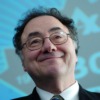
Bernard C. Sherman (born 1942), Chairman and CEO of Apotex Inc., is a Canadian businessman. With an estimated net worth of $US 3.7 billion (as of April 2013), Sherman was ranked by Forbes as the seventh wealthiest Canadian and 363rd in the world.
Early life and education
Sherman was born to a Jewish family and entered the University of Toronto’s Engineering Science program at age 16, the youngest to do so.[citation needed] He also graduated from Engineering Science with the highest honours in his class and received the university’s Governor General’s Award for his thesis. He then received a Doctoral degree from MIT.
While at Toronto’s Forest Hill Collegiate Institute and completing his university education at University of Toronto, Sherman often worked for his uncle Louis Lloyd Winter, at his pharmaceutical company, Empire Laboratories. Empire was the largest Canadian wholly owned pharmaceutical company at that time. When his uncle would travel, Sherman often helped watch over the operations. Empire provided Sherman with the training and foundation for his development of Apotex Inc., a Canadian generic pharmaceuticals companies.
Career
In the summer of 1967, directly after completing his Ph.D. in astrophysics at MIT, Sherman purchased the Empire Group of Companies from the executor of Louis and Beverley Winter’s estate, as both his aunt Beverley Winter and uncle Louis Winter had died seventeen days apart in November 1965, leaving four orphaned young children: Paul Timothy, Jeffrey Andrew, Kerry Joel Dexter, and Dana Charles. Prior to the purchase, Empire was the first to secure the compulsory rights to manufacture Hoffman-La Roche’s Valium (diazepam), and was one of Canada’s largest manufacturers of Pfizer’s Vibramycin (tetracycline), Upjohn Company’s Orinase (tolbutamide), and the dietary sweetener Saccharin. To facilitate the corporate acquisition, Sherman along with his high school friend, Joel Ulster (Sherman and Ulster Limited), offered five percent equity options to each of the four children and a fifteen-year royalty on four of its patented products. In 2011 the Winter children’s estate sued Sherman and Royal Trust concerning the purchase of the corporate assets and brands from the Winter children’s estate, alleging in court that Sherman and his partner never paid the royalties nor provided the promised equity in the businesses. As of January 2012 the case was still in court, with the plaintiffs seeking an interest in Apotex or damages of $1 billion.
In 1970 he invested in New York’s Barr Laboratories with US-based partners, became its largest shareholder and served as Barr’s president. As of 2000, he controlled about 33% of Barr Laboratories’ stock. Barr won the first rights to manufacture generic versions of Eli Lilly’s Prozac. Today, Barr Laboratories’ is a division of Barr Pharmaceuticals, Inc., with its head office in Montvale, New Jersey, and it is publicly traded on the NYSE using the symbol BRL. In 2004, the Company ranked sixth among the world’s top ten independent companies in the $11 billion generic pharmaceutical business. Barr is Wal-Mart’s main pharmaceutical supplier according to Forbes, and its annual 2007 sales exceeded $2.5 billion US.
In January 1972, Sherman and Ulster Limited sold Empire Laboratories to the Quebec-based Canadian operations of publicly traded International Chemical and Nuclear (ICN) of California, for 57,000 shares (Valeant Pharmaceuticals). In 1973, Sherman started Apotex with a few former Empire Laboratories’ personnel and he incorporated it in 1974. This privately owned and Sherman controlled company is today in the top 15 of the world’s largest generic pharmaceuticals with its head office in Toronto; it claims to be Canada’s largest Canadian-owned pharmaceutical. Sherman also became involved in Nutraceutical manufacturing and other businesses, founding NION (National Institute of Nutrition) with Richard Kashenberg. He later sold the company to Schiff and continued onto Apotex.
On July 18, 2008, Teva Pharmaceutical Industries Ltd. (Nasdaq: TEVA), one of the world’s largest pharmaceutical companies, announced its proposed acquisition of Barr Pharmaceuticals, Inc. for a total consideration of $7.46 billion US plus the assumption of net debt of approximately $1.5 billion. Teva Pharmaceutical confirmed on December 8, 2008 that it has secured the required financing to complete the transaction.
Source:wikipedia
